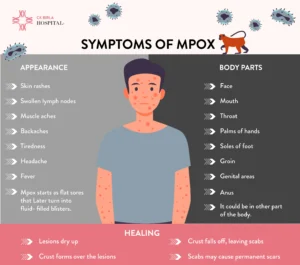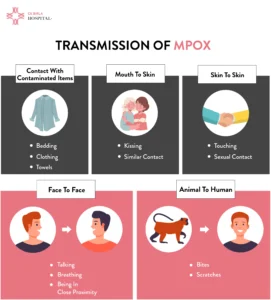Mpox (Monkeypox): Causes, Symptoms, Prevention & Treatment
Prevention is always better than cure, especially when you don’t know how deadly the virus can be and how to treat it. As mpox (Monkeypox) cases rise in India, fear and myths about the virus are spreading at an equal pace.
This leaves us unsure of what to believe and not, which leads to confusion, frustration, and panic. Hence, it’s important to understand what the monkeypox virus is, its symptoms, causes, and prevention.
Table of Contents
What is Mpox Virus (Monkeypox)
- Mpox is a communicable disease caused by the monkeypox virus (MPXV).
- This virus is quite similar to smallpox.
- It leads to red spots, blisters, bumps, and flu-like symptoms.
- Mpox usually affects rodents, such as mice and rats, and non-human primates, such as monkeys, but it can also occur in people.
- The virus spreads through close contact with animals or people who have monkeypox. It can also spread through travel and contact with imported animals.
What are the Causes of Mpox?
According to WHO, monkeypox is a species of the Genus Orthopoxvirus in the Poxviridae family, which also has variola, vaccinia, and cowpox. The first case of the monkeypox virus was reported in 2022 in African regions, such as Central and Western Africa, and it continues to be a threat today.
Mpox is Divided into two parts:
- One is originated from Central Africa (Clade I)
- The second one is from West Africa (Clade II)
- The 2022-2023 outbreak is caused by Clade IIb, which is a less severe subtype of the West African clade.
What are the Symptoms of Mpox?
- You may notice its symptoms from 1 to 21 days after you get infected.
- The time between when you get infected with a virus and when you notice symptoms is called the incubation period.
- Its symptoms last 2 to 4 weeks but may last longer in people with low immunity.

How is Mpox Transmitted?
Simply put, the monkeypox virus spreads through close contact with an infected person or animal. Close contact includes:
- Individuals who are sexually active with multiple partners are at a higher risk of contracting Mpox.
- During the pregnancy, if the mother is infected with this virus, it may pass to the baby.
- Contracting the mpox virus during pregnancy can be fatal for the foetus or newborn and may result in pregnancy loss.
- If pregnancy continues, it may cause complications for the parents.
How do I Diagnose Mpox?
Identifying monkeypox virus can be a challenge for you. Because other infections and conditions can also look similar, including chickenpox, bacterial skin infections, and sexually transmitted infections.
- It can be possible that someone who has mpox may also be infected with other sexually transmitted infections at the same time, such as syphilis or herpes.
- If a child is suspected of having mpox, they also might be checked for chickenpox.
Tests are a key to getting optimal care early, which can prevent you from severe illness.
- The best laboratory test for mpox virus is PCR (Polymerase Chain Reaction).
- It detects viral DNA.
- The sample is taken directly from the rash, using swabs of the skin, fluid, or crust.
- In case if there are no skin lesions, swabs from the throat or anus can be used.
- Blood tests are not required here.
- It may recommend HIV testing for adults with mpox.
How Do I Prevent Mpox?
The aim of treating mpox is to care for the rash, manage pain, and prevent complications. Early care is essential for managing symptoms and avoiding further problems. Additionally, the mpox vaccine can help prevent infection, especially in high-risk individuals during outbreaks.
High Risk Groups for Mpox Include:
- Healthcare workers who are exposed to the virus are at risk.
- People with multiple sexual partners, especially men who engage in sexual activity with other men, are also at higher risk.
- Sex workers of any gender, male and female, as well as their clients, are vulnerable as well.
You can also receive the vaccine after being exposed to someone with mpox (post-exposure prophylaxis). It is recommended to take the vaccine within days of contact. If you haven’t developed symptoms, you can still receive the vaccine up to 14 days after exposure.
Monkeypox Virus: Self-care and Prevention
Most people will recover from this virus within 2-4 weeks. Additionally, you can follow these steps to prevent the transmission of mpox to others.
- Contact your healthcare provider for advice.
- Stay at home in a well-ventilated room.
- Wash hands regularly with soap or sanitizer.
- Wear a mask and keep your sores covered.
- Keep skin dry and uncovered when alone.
- Avoid touching shared items and disinfect spaces.
- Use saltwater rinses for mouth sores.
- Take warm baking soda baths for body sores.
- Take pain relievers like paracetamol or ibuprofen.
Conclusion
Understanding monkeypox and following preventive measures are key to protecting yourself and others. Early care, vaccination, and simple hygiene practices can help manage symptoms and prevent the spread of the virus.
FAQ Around Mpox (Monkeypox)
Is Monkeypox deadly?
No, monkeypox is rarely fatal, and most people recover within a few weeks. However, in some cases, it can be complicated, especially for those who have low immunity, like pregnant women or young children. Early treatment and proper care can help manage symptoms and reduce the risk of severe illness.
How does Monkeypox spread?
It spreads through close contact with an infected person or animal or through contaminated surfaces.
Is Monkeypox curable?
There is no specific cure, but symptoms can be treated, and most people recover on their own.
Is Monkeypox a pandemic?
No, monkeypox is not considered a pandemic, but outbreaks can occur.



